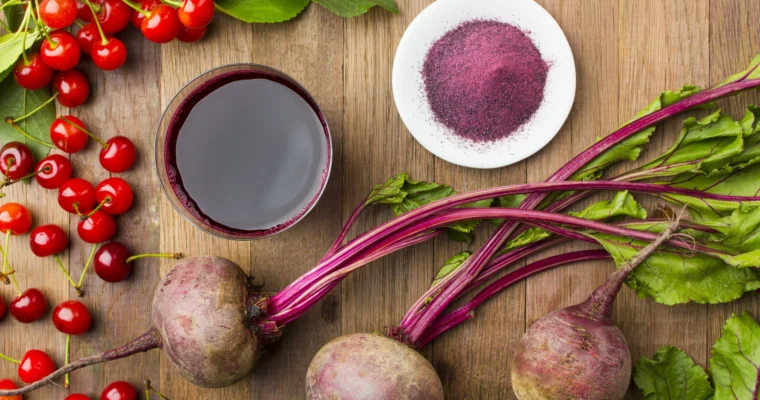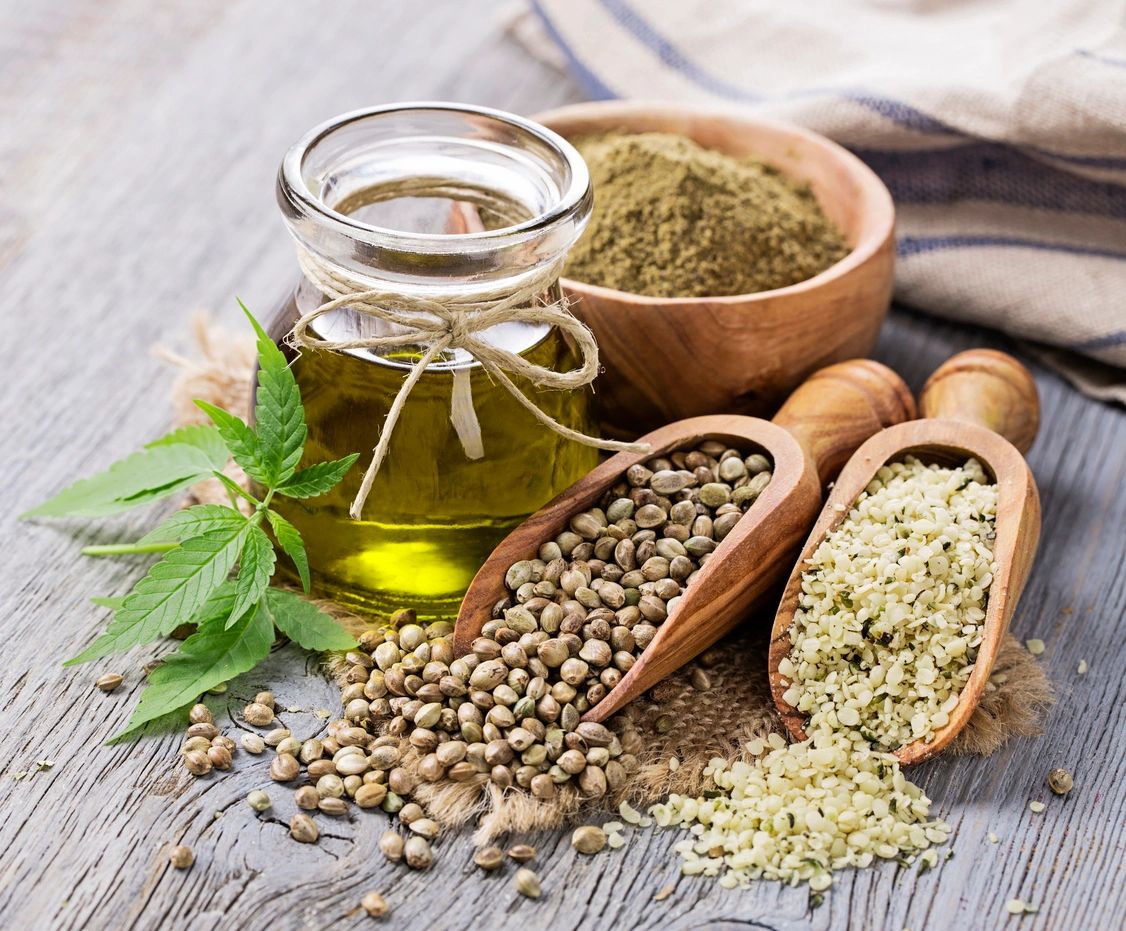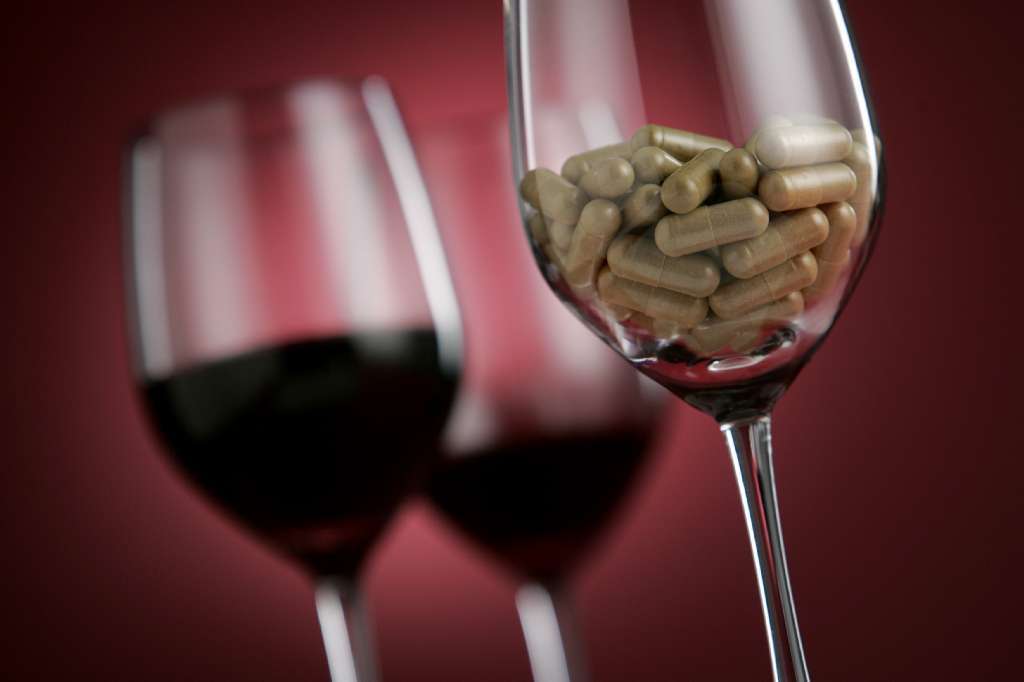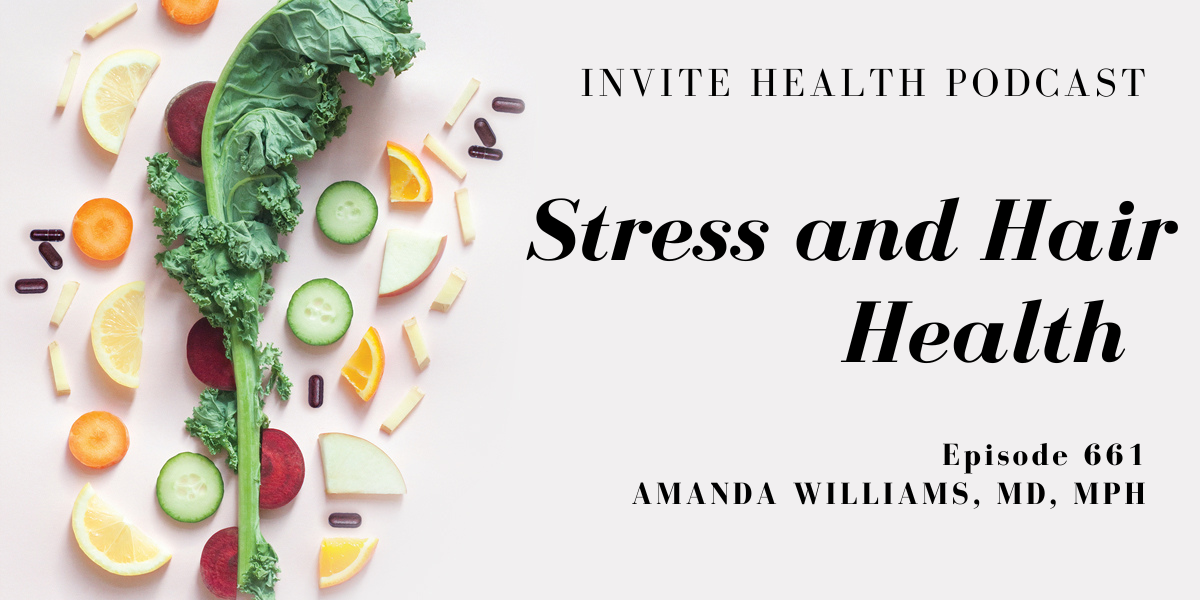Subscribe Today!
Please see below for a complete transcript of this episode.
STRESS AND HAIR HEALTH, INVITE HEALTH PODCAST, EPISODE 661
Hosted by Amanda Williams, MD, MPH.

*Intro Music*
InViteⓇ Health Podcast: [00:00:04] Welcome to the InViteⓇ Health Podcast, where our degreed health care professionals are excited to offer you the most important health and wellness information you need to make informed choices about your health. You can learn more about the products discussed in each of these episodes and all that Invite Health has to offer, at www.invitehealth.com/podcast. First time customers can use promo code podcast at checkout for an additional 15% off your first purchase. Let’s get started. †
*Intro Music*
Amanda Williams MD, MPH: [00:00:40] The long-lasting effects of stress can be incredibly detrimental to our overall health, and many times we don’t look at the influence or the impact of stress when it comes to the health of our hair, which is why I want to discuss this. I want to talk about the science of analyzing the level of stress and the health of our hair. We definitely know that stress influences every single system in the body. Oftentimes when people are stressed, you may find that you have disruptions in your diet, your appetite, you have a problem when it comes to sleeping. Obviously, there can be issues when it comes to blood pressure and heart rate. But did you ever think hey, stress is making the quality of my hair really not so great? This is why I think that this is a very valid topic to discuss. I am Dr.Amanda Williams, Scientific Director at Invite Health. And when it comes to hair health, most folks are really zeroing in on what they can be doing differently in order to improve the quality of their hair. Well, luckily for you, we have a wonderful formulation that’s incredibly comprehensive and that is our Hair Enhance Hx. This formulation is designed to target all of those root causes of hair loss including stress. We know that hormone imbalance definitely is a contributing factor. We know that nutritional deficiencies certainly can lead to problems. We know that chronic inflammation definitely can be detrimental to the health of our hair, leading to weak, brittle hair. When oftentimes people, say, oh, my hair is just kind of lackluster, doesn’t have that same shimmer or shine that it once used to. This formulation targets all of those causes. So, what is actually in this formulation? What is the science behind all of these nutrients? Well, it has the key vitamins and minerals and amino acids that the hair requires in order to maintain its structural integrity. Things like Biotin and Zinc, it has the amino acids, methionine, and cysteine and arginine. It also has a really wonderful antioxidant blend, including a registered trademark form of vitamin E, known as EvNoMax. This also contains apple polyphenols. Yes, antioxidants that come from apples to help to promote the production of keratin to once again zero in on that structural integrity of the hair. † [00:03:06]
[00:03:06] Saw palmetto extract is in this to create a more balanced hormonal system. And this is important for both men and women. When you think about male pattern baldness, but women also can experience this. So having the saw palmetto extract certainly is incredibly supportive in this formulation and it has the power of catalase. So, if you look in the mirror and you see some of those signs of aging, the graying in your hair, this oftentimes will mean that you need some additional catalase. This is a natural antioxidant that the body makes that helps to offset the negative accumulation of hydrogen peroxide. So, having catalase in this supplement will help gander up higher levels of this powerful antioxidant to negate the effect, hence the graying of the hair, that high hydrogen peroxide can create. So, let’s just talk about the science. Let’s understand how it is that stress itself is affecting hair growth and the hair growth cycles. They have studied this quite extensively at this point in time. And in The Journal of Drugs and Dermatology, they talk about how cortisol actually induces hair growth, disruption. We know that our stress hormone cortisol affects so many areas in our body, our thyroid function, so hence metabolism, it can affect our blood sugar regulation, because it impedes proper insulin release. But we can also see how it actually leads to a reduction in the synthesis of new hair. And it’s doing this because it’s screwing up, it’s best way to put it, the hylaurons and the proteoglycans. And this is a major problem. So, not to get too heavy into the science on this, but we have to realize that there is truly a burden of hair loss that is brought on because of stress. And for so many Americans who walk around every single day with high levels of stress and don’t have good ways to really minimize that stress, you don’t have the proper techniques that you’re using. At the end of the day this can start to affect every single system and what you may visibly see is the loss of quality in your hair as well as the loss of hair strands itself. And we have seen studies where they’ve actually mimicked this. † [00:05:29]
ICYMI: CAROTENOIDS FOR MORE THAN EYE HEALTH, INVITE HEALTH PODCAST, EPISODE 660>>LISTEN NOW
[00:05:29] They did a really interesting study over in Germany where they took a group of healthy women between the ages of 18 and 48 years old, and they had their test group set up. So, none of these women were currently taking any type of medication. So, no prednisone, no steroid medications, no hormone medications, not even on medications for blood pressure, diabetes, these are considered to be healthy women. And they set up a study design in which they could induce high stress environments, and they were assessing the immune system’s response to this, looking at the level and the rate of inflammation and then assessing the actual quality of the hair. And through just these short bursts of having high stress, they could see where the quality of the hair and the hair growth itself was actually disrupted directly, because of the stress itself. So, now you take individuals who are under stress on a regular basis, and you say, oh, no wonder why so many Americans are looking and seeking out ways that they can improve upon the health of their hair. But we have to do this in an approach that addresses the main problem, which is stress. So, we have to be mindful about this, we have to look at ways to which we can lessen our daily stressors. This can come from having healthier food choices every single day. So, incorporating in high antioxidant fruits and vegetables, as well as having healthy fats coming from seeds and nuts, can really be quite beneficial to the health of your hair. Say, for example, if you do feel like you have maybe some low mood anxiety, maybe snacking on pumpkin seeds can actually help to improve the health of your hair because it’s going to help to release serotonin and in turn, give us a better sense of well-being. So, if we can lessen the stress, we can improve the hair quality, and then we can help this all along with those powerful nutrients that are contained in the Hair Enhance Hx, as I already mentioned, some of those nutrients that are contained in that, including the apple polyphenols. Now, the apple polyphenols that we use in this product have been clinically studied in the setting of being able to potentiate the or enhance the expression of keratin, which is really important when you think about the structural integrity. So, there are a lot of different nutrients out there that can help to provide this extra kick of this added benefit. And this is hence why we have these powerful antioxidants that are derived from those apples, because we know that it’s going to work synergistically in the body to improve keratin production, so, hence better hair. † [00:08:18]
[00:08:18] And then we use the EvNoMax, this is a registered trademark form of vitamin E that has been studied in clinical research trials shown to help promote new hair growth, as well as to improve upon the quality of existing hair. So, these are the types of things that we want to start to address. We have to look at our stress, we have to say what can make the biggest differences. Do I start to exercise every day as well as eat healthier? So having those fruits and vegetables, snacking on seeds and nuts, finding ways to decompress, whether that’s through breathing. techniques or meditation, maybe doing yoga. Or maybe just taking a walk in your neighborhood where you can detach from your daily stressors, even if that’s just for ten or 15 minutes. This can help to improve the quality of your hair. So, now when you’re taking the Hair Enhance Hx, you’re going to really start to see those noticeable differences, you’re going to see how the improvement in the quality of your hair and how new hair growth is starting to occur for you, and it’s going to be sustainable. This is going to last because we’re addressing all of the issues, including the main problem, which is that stress. So, looking at the burden of hair loss, understanding that this has been research that they’ve set up, study designs that show that just short amount of stress, think about that fight or flight that can affect the quality of your hair, that can disrupt the way that the hair itself is moving through that hair shaft. And now imagine if you have stress on a regular basis, this is why we have to do better with stress management techniques and we have to improve upon all aspects of our diet, exercise, as well as adding in powerful nutrients that can help to rebuild and restructure the hair, and promote those powerful antioxidants to fight off external environmental toxins that can damage the hair, as well as things that are created inside of the body that can also be detrimental to the health of our hair. So, next time you’re thinking, gosh, I feel stressed out, maybe you should take a look in the mirror and say to yourself, “How can I protect my hair from shedding more than necessary?” And this is where that Hair Enhance Hx, along with the assistance of our wonderful nutritionist at Invite Health can help you when it comes to improving the quality of your hair even in the setting of stress. So, I want to thank you so much for tuning in to the InViteⓇ Health Podcast. Remember, you can find all of our episodes for free wherever you listen to podcasts or by visiting, invitehealth.com/podcast. Do make sure that you subscribe, and you leave us a review. You can follow us on Facebook, Twitter, and Instagram, and we will see you next time for another episode of the InViteⓇ Health Podcast.† [00:08:18]
*Exit Music*











